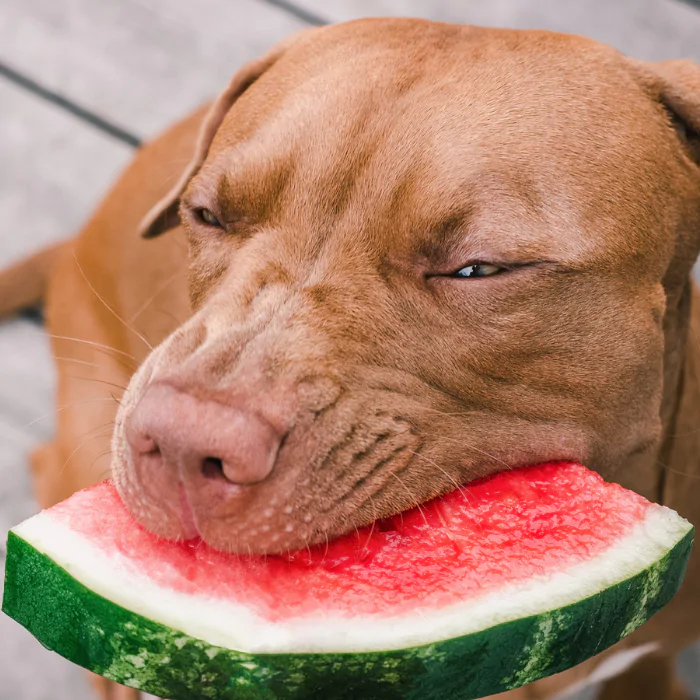
What human food can dogs eat?

Dr Jessica May, FirstVet vet
2 August 2021 | 6 minutes read
Dogs are part of the family, so we know you want to share mealtimes with them too. But, not all human food is suitable for your pets to eat. And human food is something that your pet should only consume on a small, treat basis.
Here, FirstVet vet Dr Jessica May answers your most common ‘can my dog eat…’ questions.
Table of contents
- Can dogs eat bananas?
- Can dogs eat apples?
- Can dogs eat oranges?
- Can dogs eat strawberries?
- Can dogs eat blueberries?
- Can dogs eat tomatoes?
- Can dogs eat cucumbers?
- Can dogs eat grapes?
- Other human foods your dog can eat
- Human food your dog should avoid eating
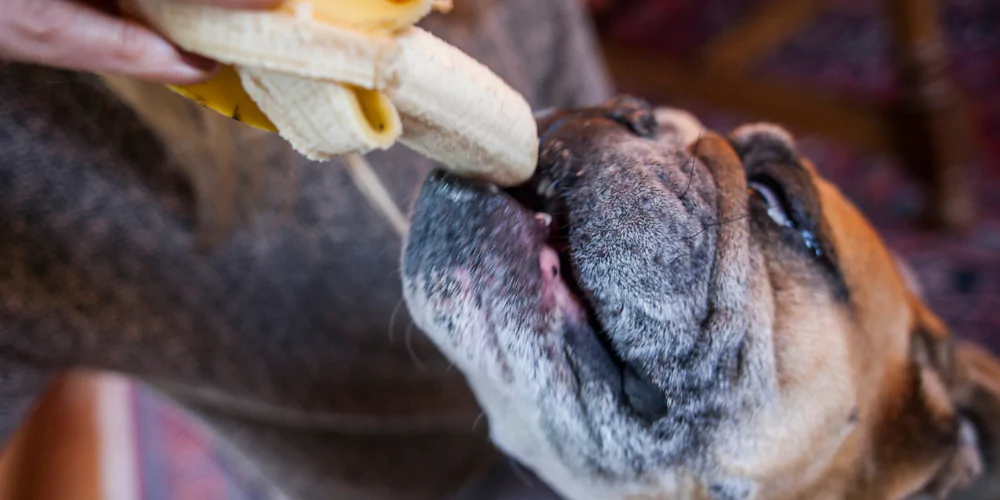
Can dogs eat bananas?
Bananas are perfectly safe for your pooch. They’re high in fibre, potassium, Vitamin B6 and C, and so they make a tasty nutritious snack, whether it’s straight from the peel or mashed up within your dog’s food. But, they should be given only as an occasional treat as, like most fruit, they contain a lot of sugar.
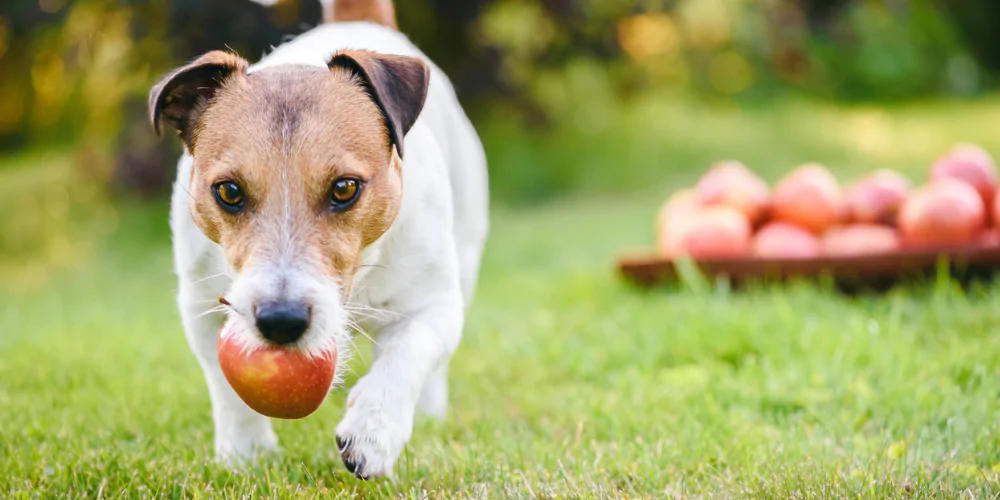
Can dogs eat apples?
Apples are another human food that can make a paw-some snack for your canine. Like bananas, they’re also high in fibre and Vitamin C, as well as containing Vitamin A and being low in protein and fat. You should take care that the seeds and core are removed before feeding to your dog as they contain traces of cyanide.
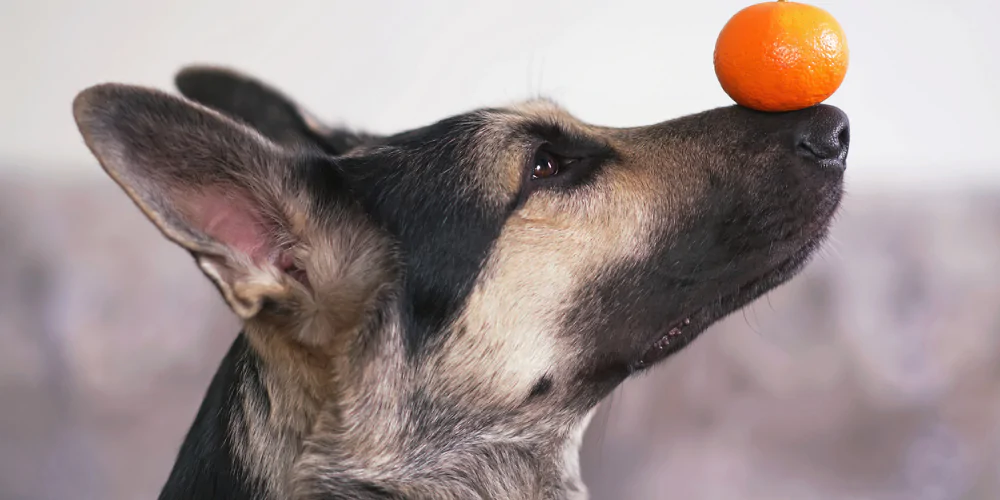
Can dogs eat oranges?
Oranges are full of vitamin C as well as containing potassium, fibre, and being low in sodium. This makes them a great treat for your dog to enjoy now and then. But, make sure you remove the peel, pith, and seeds as these can be toxic.
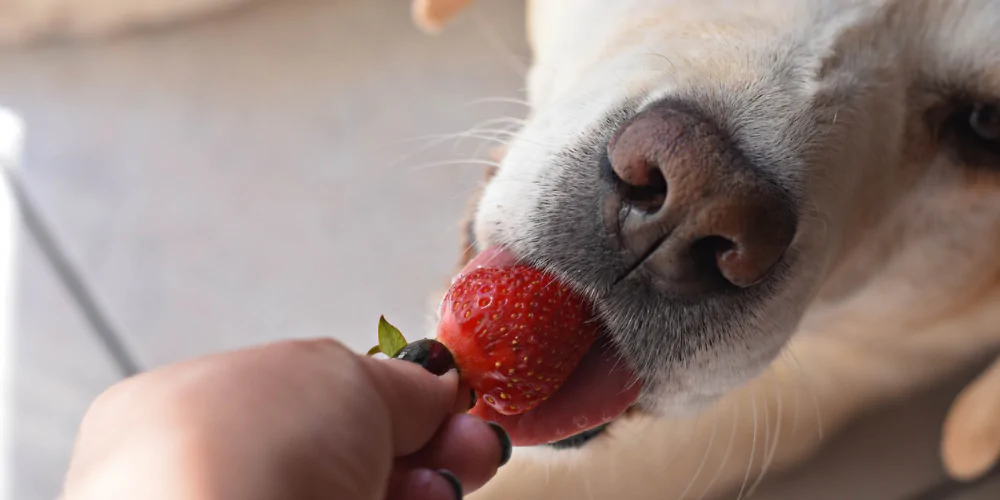
Can dogs eat strawberries?
One of the berry (sorry!) best treats for your dog are strawberries. Not only do they have fibre, Vitamin C, and are high in water content, they also contain a special enzyme that can keep your dog’s teeth pearly white. Like bananas, fresh strawberries also contain a lot of sugar, so only give them as the odd treat.
You should only feed your dog fresh strawberries and never tinned fruit. This is because sugar is added to the tins to help preserve the fruit.
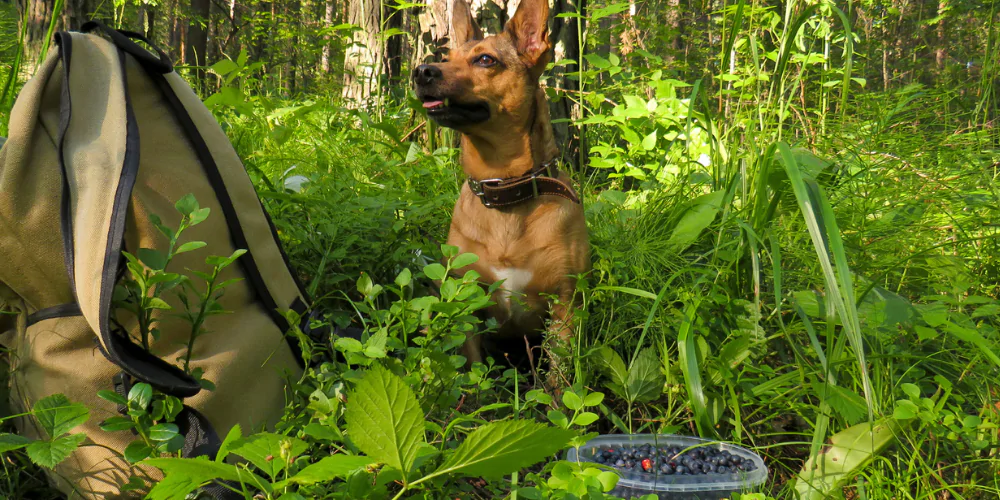
Can dogs eat blueberries?
Yes, blueberries are a brilliant human superfood for your dog! Full of antioxidants, fibre, and Vitamin C and K, blueberries help to keep your pet’s immune system healthy.
While both strawberries and blueberries are safe for your dog to eat, this is not true of all berries. Your dog can safely eat raspberries, blackberries, and cranberries, but you should avoid berries such as juniper berries as these are poisonous to your pet.
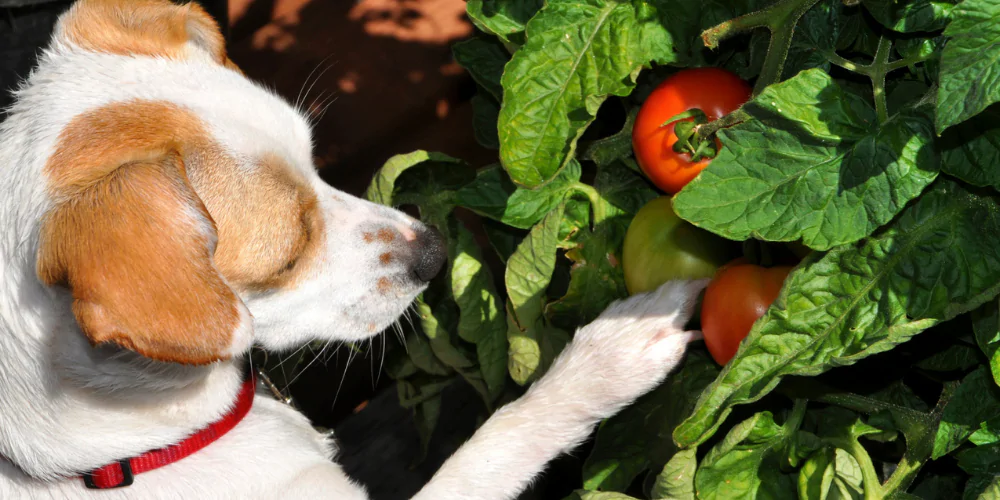
Can dogs eat tomatoes?
Ripe, red tomatoes are absolutely safe for your dog as a treat. But, you should never feed your dog green tomatoes as these can be poisonous. Similarly, tomato-based food like tomato soup and sauces should be avoided as these often contain other ingredients that can be poisonous to your dog, such as garlic.
Avoid tinned tomatoes too as, just like with other tinned fruit and vegetables, preservatives are added to keep them fresh.
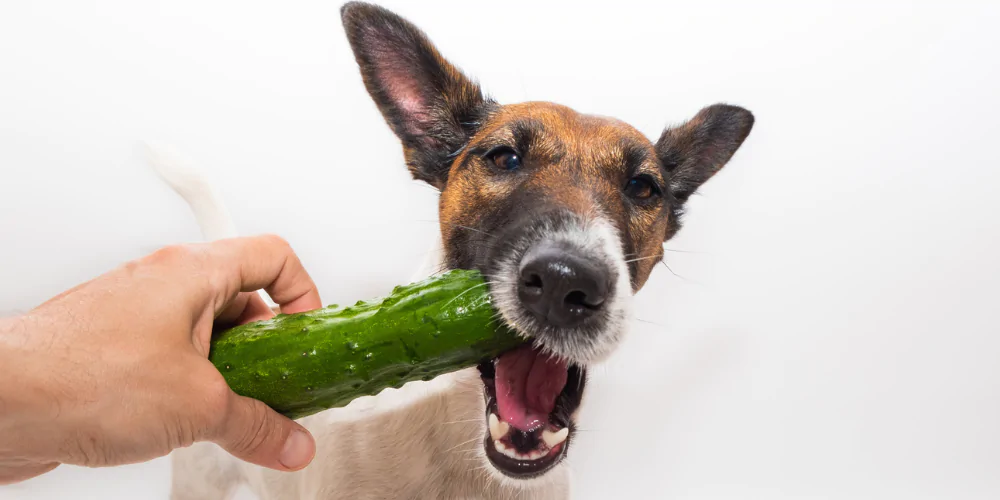
Can dogs eat cucumbers?
Low in calories and high in water content, cucumbers are a deliciously healthy and hydrating treat for your pooch. But, when feeding your dog cucumber, make sure it hasn’t been covered in salad dressing.
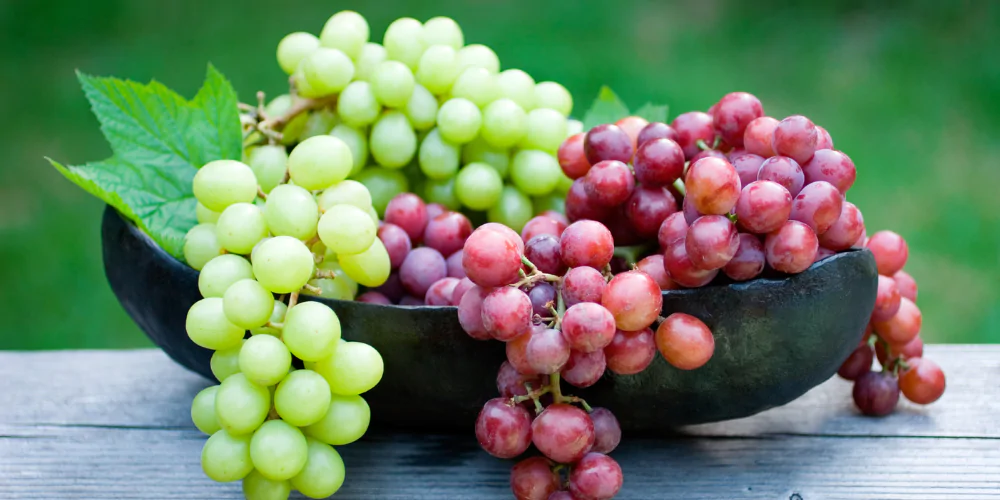
Can dogs eat grapes?
Grapes (and similarly raisins) are extremely toxic to dogs and can result in kidney failure, which is often fatal. If your dog eats a grape or raisin, you should contact your vet immediately. Symptoms to look out for if your dog has eaten a grape or raisin include lethargy, vomiting, diarrhoea, or a lack of appetite.
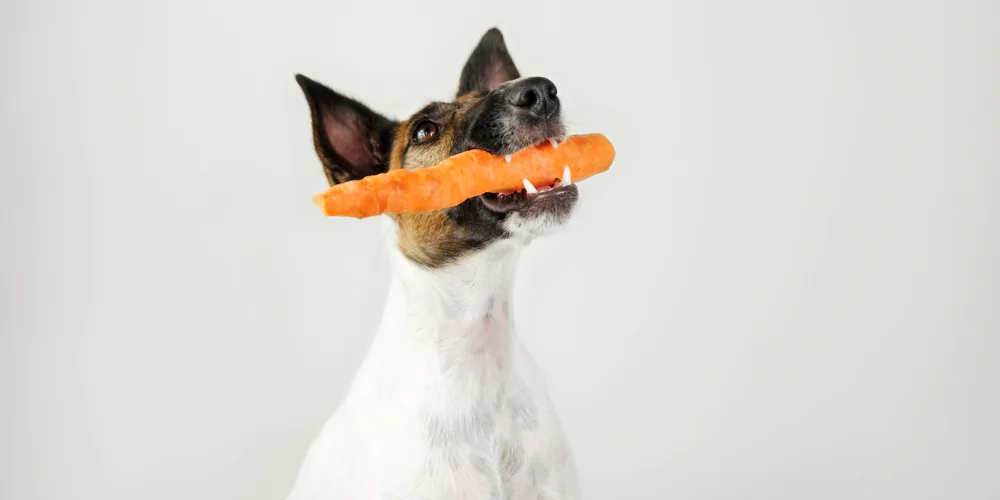
Other human foods your dog can eat
There are plenty of other human foods your dog can enjoy. Do take care that you only feed them human food in small quantities or as a special treat so as not to upset their stomachs.
Here are some of the other human foods your dog can eat:
> Carrots
Carrots are a nutritionally yummy snack for your dog. They are low in calories and contain Vitamin A to help keep your dog’s eyes, skin, and coat healthy. Carrots also help your dog’s teeth and gums to stay clean.
> Rice
Cooked rice is a good option for your favourite fur-iend, particularly if your dog has a stomach upset.
> Chicken
Plain, cooked chicken is safe for your dog to eat and is often the main ingredient in your dog’s pouch meals.
> Milk, cheese and yoghurt
Your dog can enjoy dairy products in small quantities, but too much lactose can cause digestive problems.
> Fish
Fish such as salmon and tuna are safe for your dogs to eat, as long as they’re cooked and the bones have been removed. As fish is full of Omega-3, eating it helps to keep your dog’s coat and skin healthy.
> Peanut butter
Peanut butter has a lot of health benefits for your dog as it contains Vitamin E and B, niacin, and protein. It’s important to make sure it doesn’t contain xylitol, an artificial sweetener that is poisonous to your dog.
Also high in fat, consumption of peanut butter should be kept low to reduce the risk of pancreatitis.
> Watermelon
Watermelon is a mouth-wateringly tasty snack due to its high water content, keeping your dog hydrated. Remember to make sure all the seeds are removed.
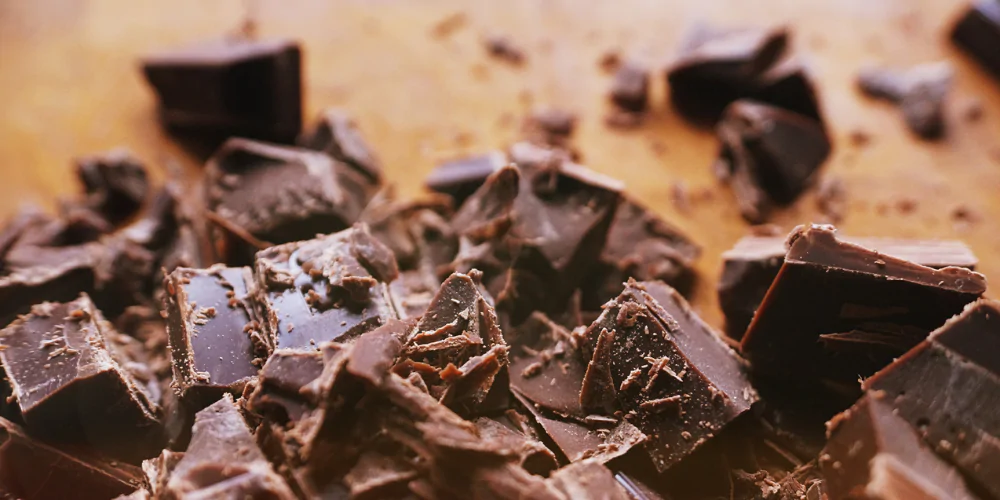
Human food your dog should avoid eating
Unfortunately, your dog can’t tell what food is safe for them to eat and what will leave them feeling ruff – to them, everything tastes delicious!
Here are the human foods you should never feed your dog:
> Chocolate
Chocolate is toxic to your dog as it contains a chemical called theobromine, which can affect your dog’s heart, guts, and nervous system. Symptoms of chocolate poisoning in dogs include vomiting, diarrhoea, panting, increased drinking and urination, restlessness, and seizures. Act fast and call a vet if your dog has consumed chocolate as it can lead to serious problems such as heart failure.
> Alcohol
Alcohol is extremely harmful to your dog. The impact of the amount of alcohol consumed is dependent on the size of your dog. If you suspect your dog has alcohol poisoning, some symptoms to look out for include vomiting, diarrhoea, dehydration, disorientation, breathing difficulties, and seizures. Consult with your vet immediately if you think your dog has consumed alcohol.
> Macadamia nuts
Not all nuts are poisonous for dogs, but the macadamia nut is. If your dog ingests macadamia nuts, look out for symptoms including vomiting, a lack of appetite, fever, and abdominal pain.
> Onions and garlic
Onions and garlic are toxic to dogs and can cause the breakdown of red blood cells, which can lead to anaemia. Symptoms to look out for with onion and garlic poisoning are lethargy, decreased appetite, vomiting, diarrhoea, and excessive panting.
> Cooked meat bones
While your dog can enjoy chicken, turkey, and other meats, as well as raw meat bones, you shouldn’t give your dog cooked meat bones. This is because they can splinter when cooked, which can prove to be a choking hazard.
If your dog has ingested any human food that’s toxic to them, you should contact your vet immediately.
Your dog deserves to be looked after. Our comprehensive pet insurance has tails wagging and includes Firstvet’s 24/7 video call access with a UK registered vet.


